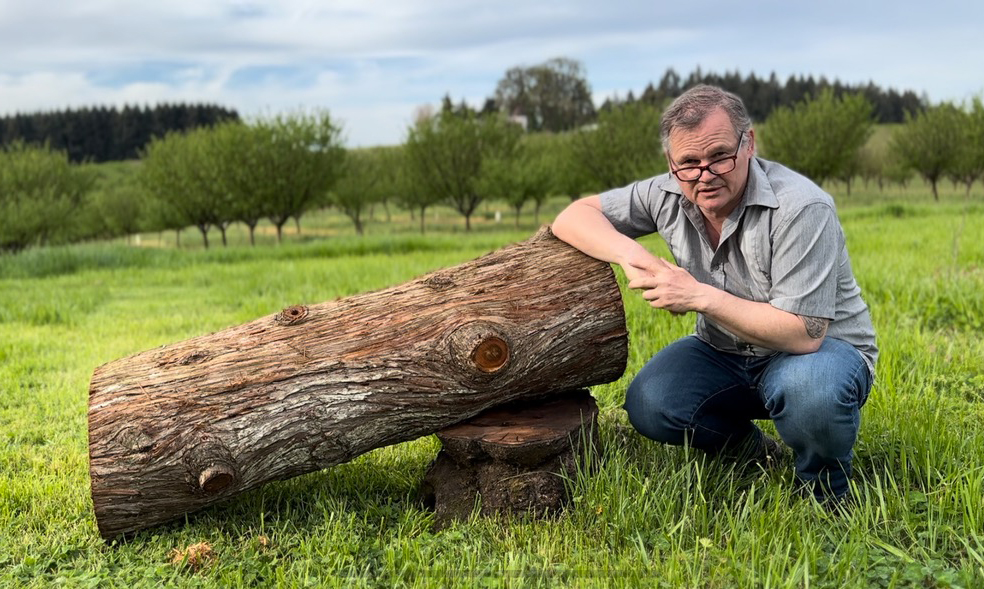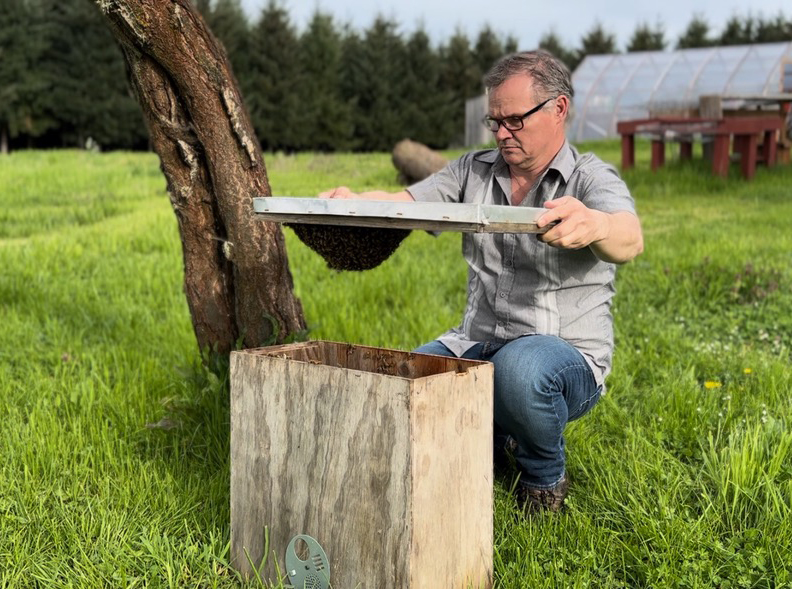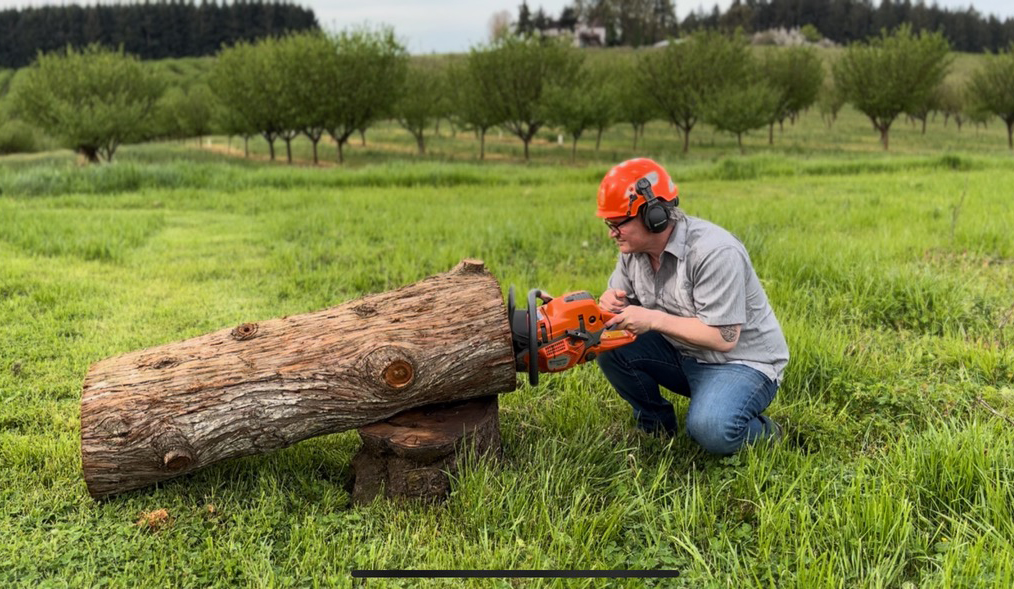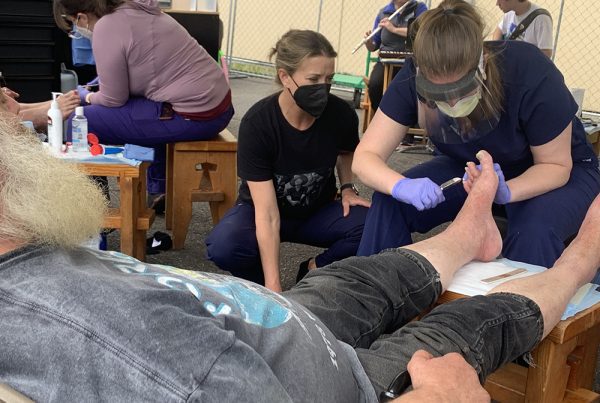As a trailblazer in natural beekeeping, Alasdair Mackenzie’s experience offers a profound insight into our relationship with nature and our tendencies to constrain it.
By Julie Showers
Natural beekeeping expert and advocate Alasdair MacKenzie‘s time with bees began conventionally with keeping wooden box hives in his yard. However, frustrated by the recurring challenges of bee mortality, he looked to nature for answers. By observing wild bees in their natural habitats, Alasdair started experimenting with housing environments, leading to the birth of a passion for natural log beekeeping.
“I experimented with a regular box hive and cardboard box, I came back in February on a sunny day at 32 degrees, and all the bees in the wood box were dead and the bees in the cardboard box were alive. The wood box condenses water onto them so they are soaking wet when it gets cold. Moisture was killing them in the box because they didn’t get airflow. The log hives have really big entrances so the wind is whipping through there with needed airflow,” Alasdair explained.

Natural beekeeping advocate and expert Alasdair Mackenzie with a hive log he installed at Blanchet Farm. Photo courtesy of Alasdair Mackenzie.
Unlike traditional beekeeping methods that often rely on chemical treatments and interventions, Alasdair’s log hives are left mostly untouched. The bees find their food, develop resistance to pests through natural selection, and thrive in their log homes. These log hives, crafted from old trees that would otherwise be discarded, offer the bees a sanctuary where they can live and prosper as nature intended.
“I have 80-plus logs out in the world right now. You don’t have to do anything when you do natural beekeeping,” he explains. “When you’re keeping bee boxes you get pissed off because the bees keep dying and you keep putting money in and you get nothing in return. With the log hives, there is no financial transaction going on. I don’t charge for the logs or bees. Don’t treat them, feed them, or open the box up, and they’ll thrive.”
Natural Beekeeping Honey
The goal of most small-scale beekeeping endeavors is to produce honey and wax for personal use or sale. With natural beekeeping, honey is something you must wait for. Unlike conventional methods where honey production is often prioritized and accelerated, natural beekeeping allows bees to produce honey at their own pace, emphasizing patience and respect for the bees’ natural rhythms.
“You’ll get large bricks of aged honey from log hives that will make you never want to eat honey from a store again,” Alasdair enthusiastically shares. “The honey is wrinkled up and really dark. There’s something going on between the log and the bees as the log breaks down. I think that is affecting the honey. The old-timers talk about this.”

Natural beekeeping advocate and expert Alasdair Mackenzie lifts the lid off a swarm he collected to introduce to a log he installed at Blanchet Farm. Photo courtesy of Alasdair Mackenzie.
The Healing Power of Bees
For Alasdair, beekeeping is not just about conservation, it’s also a therapeutic endeavor. The act of tending to the bees, observing their behaviors, and connecting with nature has been instrumental in his journey of alcohol recovery. The bees, in their mysterious way, have become his companions, confidants, and therapists.
“I have a life now where I don’t drink and do a lot of bee work. What I came to discover through AA, drinking is not good for me and I was disconnected from nature–disconnected from creation and a creator. I don’t know what that really means but we’re not connected like we used to be 300 years ago. When I got back into nature I felt a bit more at peace, less bothered by things,” Alasdair shared.
Alasdair’s natural beekeeping methods have garnered attention and sometimes controversy. While some advocate for chemical treatments to combat mites, Alasdair stands firm in his belief in the resilience of bees and their ability to learn survival techniques. His logs have survived harsh winters when traditional box hives failed, showcasing the effectiveness of this alternative approach.
“Bees know what to do, they’ve been doing it for thousands of years. Parasites like mites are developing resistance to chemicals so you have to come up with more innovative ways. Natural selection is the best way for immunity. They groom each other for mites and toss them out of the hive,” Alasdair says. “We do need commercial beekeepers to pollinate so we can feed 8 billion people but the bees are becoming dumb and don’t know how to care for themselves. The bees have become dependent on us.”
His bee hive logs, now numbering over 80, have been placed in urban gardens, CSAs, and now Blanchet Farm in Yamhill County, Oregon. At its core, Alasdair’s mission is rooted in mental wellness. His rediscovery of nature and the therapeutic benefits of beekeeping have been transformative, helping him find peace and purpose without the crutch of alcohol. The therapeutic benefits of bees are something he hopes will help the residents staying in Blanchet Farm’s addiction recovery program. The natural log hive installed at the farm by Alasdair will complement the already thriving therapeutic beekeeping program created and sustained by beekeepers Katy Fackler and Brian Wagstaff. The two volunteer to teach the men staying at the farm how to care for the bees and their hives.

Natural beekeeping advocate and expert Alasdair Mackenzie opens up space in an old log for a swarm of bees to inhabit at Blanchet Farm. Photo courtesy of Alasdair Mackenzie.
Telling the Bees
In European folklore, people would “tell the bees” about significant life events, believing that the bees needed to be informed to maintain harmony in their colonies. Alasdair embodies this tradition, conversing with his bees and sharing his joys and challenges with them, further deepening his bond with these remarkable creatures. It’s also a healing exercise for Alasdair and he believes it can be for others in addiction recovery.
“Bees represent the bridge between life and the afterlife. Tell the bees what your problems are,” he urges. “I put some logs out in a CSA and the farmer kept calling to say that when workers see the bees flying and coming around it lifts their spirits and keeps them company.”
Alasdair MacKenzie’s journey from conventional beekeeping to natural beekeeping is a testament to the resilience of nature and the healing power it holds. Through his work, he not only supports the conservation of bees but also promotes mental wellness and a deeper connection with the natural world. As we face increasing environmental challenges, Alasdair’s approach offers a beacon of hope and a reminder of the beauty and resilience of nature when left undisturbed.
Learn more about natural beekeeping from Alasdair on his YouTube channel 18Bees.
Learn more about Blanchet Farm’s addiction recovery program here.


















